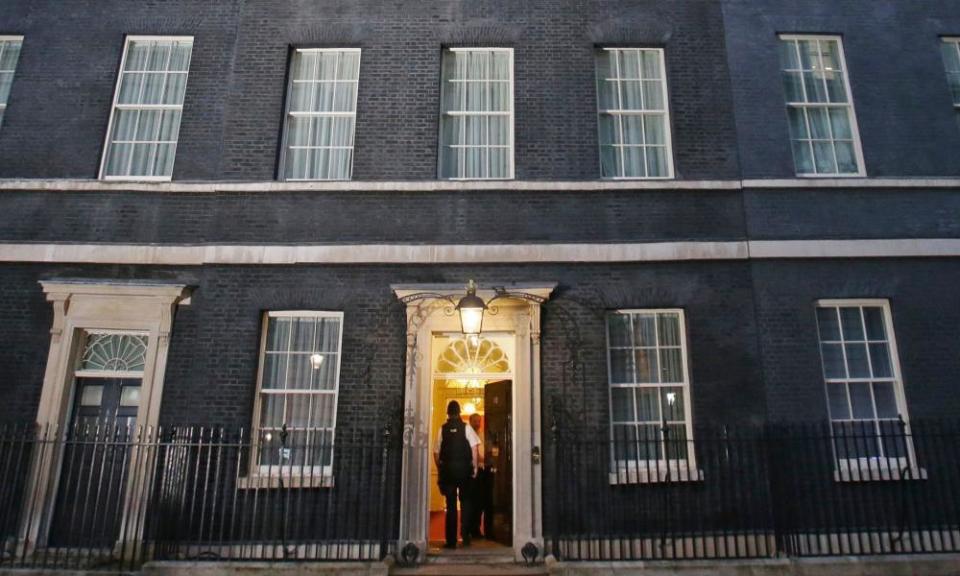What do we know about Boris Johnson’s Downing Street flat renovation?

As Labour demands investigation by Metropolitan police into PM, we assess what we know so far
There are still unanswered questions over how the refurbishment of Boris Johnson’s Downing Street flat was funded. As Labour demands an investigation into the prime minister by the Metropolitan police, here is what we know so far.
Why was there such clamour over PM’s flat renovation?
It is not uncommon for new prime ministers to want to renovate their grace-and-favour Downing Street flat. A £30,000 annual grant, funded by the taxpayer, is available to them. Fresh from his landslide election win in December 2019, Johnson and his then partner, Carrie Symonds, now his wife, pressed ahead with renovating the residence they inherited from Theresa and Philip May. The renovation, under the high-end designer Lulu Lytle, cost at least £112,000, and included gold-coloured wallpaper and fittings.
But the source of the funding became the biggest controversy. The Daily Mail initially reported Johnson wanted to set up a Downing Street trust headed by the Tory peer David Brownlow, letting donors pay for the upkeep of various parts of the estate. In response, Johnson said he had met all the costs personally. But his former adviser Dominic Cummings said he had told Johnson the plan to have donors secretly foot the bill was “unethical, foolish, possibly illegal and almost certainly broke the rules on proper disclosure of political donations if conducted in the way he intended”.
Related: Met considering whether to investigate PM over Downing Street flat refurb
While Cummings certainly had an axe to grind, it prompted Johnson’s ethics adviser, Christopher Geidt, to launch an investigation. Lord Geidt concluded the prime minister acted “unwisely” to proceed with the renovations without “more rigorous regard for how this would be funded” given the trust never came to fruition, but said Johnson assured him he “knew nothing” about the source of the payments “until immediately prior to media reports in February 2021”.
However, the Electoral Commission then opened an investigation into whether a £52,000 donation from Lord Brownlow’s company, Huntswood Associates Ltd, had been declared properly by the Conservatives. It concluded the donation was not declared properly and fined the party £17,000. It also revealed that WhatsApp messages were exchanged between Johnson and Brownlow in November 2020. This prompted Geidt to reinvestigate, given the suggestion Johnson had known about the source of the money, despite claiming otherwise. Geidt ultimately concluded in January 2022 that he still believed Johnson had not broken the ministerial code, but cast doubt on whether he would still have found in May the previous year that the prime minister took all steps to make the correct donation and seek advice when he first became aware of the payments.
Is there any further scrutiny Johnson could face?
The only other person who could have investigated Johnson was parliament’s standards commissioner, Kathryn Stone. However, she assured No 10 in January that she would not be launching her own investigation into whether Johnson broke the MPs’ code of conduct. It was believed that given Johnson’s flat is used in his ministerial capacity, Geidt’s role for investigating potential breaches of the ministerial code was the final hurdle for Johnson to clear.
Given the content of Johnson’s messages with Brownlow only became public in January 2022, Labour is calling for the police to investigate Johnson and why he asked Brownlow to approve more redecorating funds in the same message as he promised to look at a project known as the “great exhibition 2”.
What do we still not know?
Labour wants to know if there were further messages from Johnson, particularly related to the “great exhibition 2”. There is no suggestion that Brownlow has failed to divulge relevant communications.
Another question centres on how Johnson ultimately paid £112,549 direct to the supplier of the renovations, before the supplier returned the funds from Brownlow and the Cabinet Office.

 Yahoo Sports
Yahoo Sports 